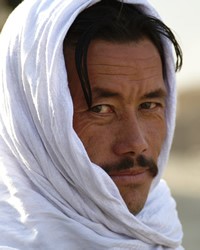Hazara in United States

Photo Source:
Anonymous
|
Send Joshua Project a map of this people group.
|
| People Name: | Hazara |
| Country: | United States |
| 10/40 Window: | No |
| Population: | 31,000 |
| World Population: | 4,775,700 |
| Primary Language: | Hazaragi |
| Primary Religion: | Islam |
| Christian Adherents: | 0.50 % |
| Evangelicals: | 0.40 % |
| Scripture: | New Testament |
| Ministry Resources: | Yes |
| Jesus Film: | Yes |
| Audio Recordings: | Yes |
| People Cluster: | Persian |
| Affinity Bloc: | Persian-Median |
| Progress Level: |
|
Introduction / History
The Hazaras are a distinct people of Afghanistan, set apart from fellow Afghans by religion, mixed ethnicity, and an independent nature. They have been persecuted for these differences, especially over the last 200 years. They face discrimination as Shia Muslims, a minority among Afghanistan's dominant Sunni Muslims, as well as for ethnic bias. Their Asiatic facial features make them stand out in Afghanistan.
Pre-second century inhabitants, they are likely Afghanistan's oldest. Their traditional homeland lies in central Afghanistan amid rugged mountains in a nearly inaccessible region of craggy peaks and rushing rivers called the Hazarajat.
Hazara origins are much debated. The current theory, supported by obvious Asian features, favors descent from Mongol soldiers left behind by Genghis Khan in the 13th century, with considerable Turkish admixture. Their unwritten dialect, Hazaragi, contains elements of many languages: Arabic, Urdu, Mongol, Turkish and Dari.
Prior to the 19th century, the Hazaras were 67 percent of the total population of Afghanistan. More than half were massacred in 1893 when their autonomy was lost as a result of political action. Later fundamentalist governments, including the Taliban, attempted to dismiss them historically, politically and culturally. Other people groups in Afghanistan have continued to attack them until the Hazaras were driven out of Afghanistan. Some of them have left for the United States.
What Are Their Lives Like?
Hazara women are honored in legends. Before the advent of the Taliban, these independent and industrious Hazara women were highly educated and entered teaching or medical professions as well as serving in political roles. Such women have a good chance of fitting in with a Western culture like that of the United States.
Those left in Afghanistan are not so fortunate. The Taliban is expected to continue their efforts violently persecute and marginalize the large Hazara minority in their country. Those in the West are very concerned about their people who remain in Afghanistan.
Since the end of 2011, there has been a Hazara American Association to provide needed programs and services to Hazara-Americans. They have cultural events where Hazaras can come together to enjoy their familiar food and music. They offer educational scholarships and help Hazaras get their medical and language assistance needs met.
What Are Their Beliefs?
The Hazaras are Imami Shia Muslims, otherwise known as "Twelvers," who hold a strong reverence for the son-in-law of the prophet Mohammed. A number of Hazara people who have strong ties with the Tajik people are Ismaili Shias, also known as "Seveners." There are strong antagonistic feelings between the two sects; each one often denies they have any ethnic affinity with the other.
What Are Their Needs?
The Hazaras need a safe place where they can begin new lives and careers. They might need trauma counseling, something that Christ's followers can do.
Prayer Points
Ask the Lord to call people who are willing to share Christ with the Hazaras and to help them adjust to live in the US.
Pray that God will send Christian teachers and literacy workers who can minister to Hazara refugees in the US.
Pray that the Christians who live near and among the Hazaras in the US will be bold in sharing their faith in Jesus.
Pray for the Holy Spirit to birth a cascading discipleship movement among the Hazaras for God's glory.